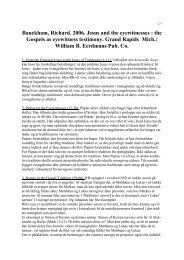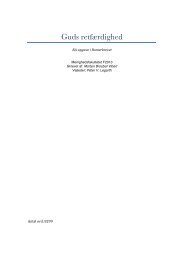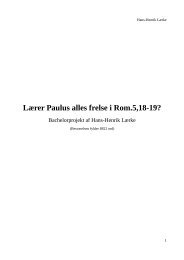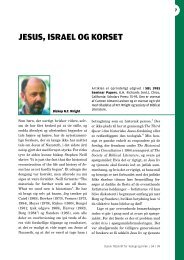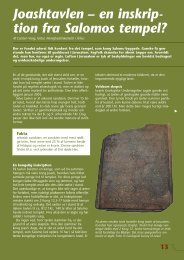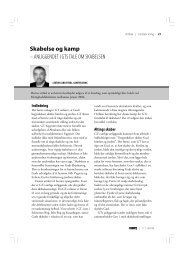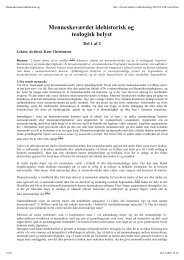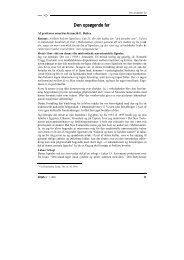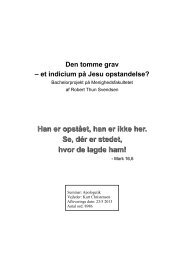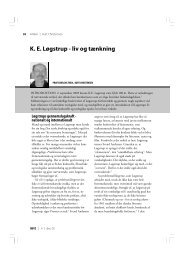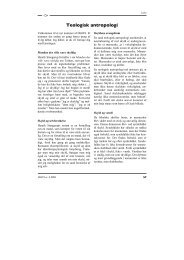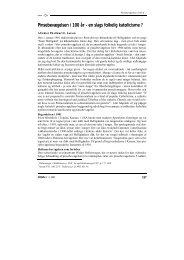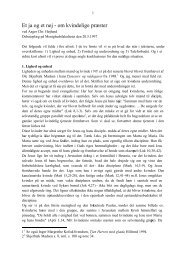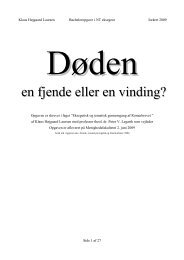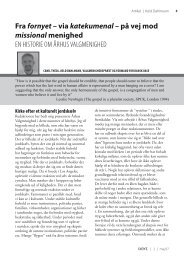Indholdsfortegnelse
Indholdsfortegnelse
Indholdsfortegnelse
Create successful ePaper yourself
Turn your PDF publications into a flip-book with our unique Google optimized e-Paper software.
Hans W. Freis filosofiske og teologiske kontekst 117<br />
Sociologien er blevet en vigtig inspirationskilde for den postliberale teologis. Lindbeck siger<br />
ved en sammenligning med en "experiental-expressive" tilgang. "I try to show that the<br />
cultural-linguistic alternative is intellectually and empirically the most adquate." (Lindbeck,<br />
p. 30). Denne "cultural-linguistic" tilgang til religion, går, inspireret af bl.a. Clifford Geertz<br />
og Peter Berger, ud fra religionen som et sprog eller en kultur, der for den "troende" er som et<br />
a priori (ibid., p. 33), der snarere end at være objekt for erkendelse og tænkning sætter kriterierne<br />
for disse. "For those who are steeped in [the preeminently authoritative texts that are<br />
steeped in them, no world is more real than the ones they create. A scriptual world is thus able<br />
to absorb the universe. It surplies the interpretive framework within which believers seek to<br />
live their lives and understand reality." (Ibid., p. 117). Derfor må teologien også benytte sig af<br />
en kultursociologisk tilgang til studiet af kristendommen, der snarere end at se på og vurdere<br />
doktriner og dogmer som ontologiske udsagn må se disse som et fællesskabs grundlæggende<br />
spilleregler: "The function of church doctrines that becomes most prominent in this perspective<br />
is their use, not as expressive symbols or as truth claims, but as communally authoritative<br />
rules of disocurse, attitude, and action. This general way of conceptualizing religion will be<br />
called in what follows a 'cultural-linguistic' approach, and the implied view of church doctrine<br />
will be referred to as a 'regulative' or 'rule' thoery." (Ibid., p. 18). Tekstens mening er dens<br />
brug i det religiøse fællesskabs liv.<br />
Frei selv lader sig, ligesom Lindbeck, inspirere af Clifford Geertz´ socialantropologi, og<br />
siger (i sine Shaffer Lectures holdt året før Lindbecks Nature of Doctrine) med formuleringer,<br />
der umiskendeligt genkendes hos Lindbeck: "I´m suggesting very simply that the Church is<br />
like that - a culture, not only of course for the observer but also for the agent, the adherent,<br />
who would understand it. There is a sacred text - a typical element in a religious system - and<br />
there are informal rules and conventions governing how the sign system works in regard to<br />
sacred scripture. The kind of theology that I like best is the kind that is closer to this outlook<br />
rather than to philosophy, or to historiography, although it is impossible to avoid philsophy."<br />
(Types, p. 13f.) Det er godtagelsen af opfattelsen af kirken som en særlig kultur der giver<br />
grundlaget for kristnes tænkning og erkendelse, som fører frem til et ønske om en tilsvarende<br />
teologi som sociologisk og antropologisk videnskab.<br />
Kathruyn E. Tanner sammenholder i artiklen "Theology and the plain sense" (Green, pp.<br />
59-78; artikelsamlingen er tilegnet Frei) Lindbeck og Frei, idet hun argumenterer for en sociologisk<br />
tilgang i teologien, eftersom den sensus literalis af de bibelske tekster, som Frei i sit<br />
sene forfatterskab fremhæver, er en funktion af menighedens praksis. "By pushing to an extreme<br />
the association between theology and social science, I hope to contribute to two lines of<br />
conversation that Frei’s work opens up: one concerns the importance of the Christian understanding<br />
of the plain sense of scripture for a Christian form of life; the other concerns the po-



